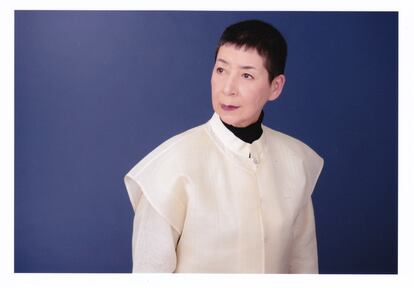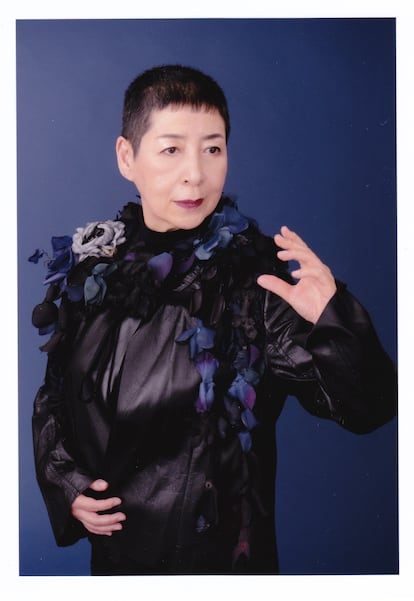Midori Takada, queen of ambient music, emerges again
A new show by the Japanese composer and percussionist has been gaining momentum. ‘People increasingly need to escape from an uncertain reality,’ she says

As ambient music goes through a second period of splendor, Midori Takada, 71, feels a bit indifferent.
The genre – which became a pillar of the music industry in the early-1980s – began a new evolution by the 1990s, with digital production software helping it become key to intelligent dance music (IDM), avant-garde electronic music of a more introspective nature. For many listeners – even today – ambient is like amputating the rhythm of house and techno.
Forty years ago, Takada – the Tokyo-born composer and percussionist – released an album titled Through the Looking Glass, inspired by Alice in Wonderland. Only 2,000 vinyl copies of the musical collection were made at the time. Today, however, each is valued at nearly $1,000.
During and after the pandemic, many were encouraged to listen to immersive music that replaces choruses, with direct and subtle impacts on the mind and body. It could be said that this effect is thanks to changes in intensity and frequencies, as well as the use of sounds of different timbres. This helps listeners mediate with the unseen and connect with nature.
Festivals, podcasts, magazines, record labels and new platforms such as Bandcamp – made by and for generation Z – have marked the scene that has revitalized the genre of ambient music. And, by extension, this new era has reintroduced various minimalist legends, including Debussy, John Cage, Robert Fripp, Steve Reich and, above all, Brian Eno. However, the acoustic aspect of ambient music owes a big debt to Midori Takada – the woman who shyly looks at her computer screen to chat with EL PAÍS, just days before she performs in Santiago de Compostela, in northwestern Spain.

Charmingly close to the camera – with very short hair, dark glasses and two small black earrings that look like grains of wild rice – Takada believes that the acoustic effect of percussion on humans is, in general, intense and disturbing. “People increasingly need to escape from an uncertain reality. Ambient music provides real, tangible emotions… a space to escape, along with originality,” she notes.
After studying music and spending time playing as a youth in Germany, she returned to Japan to study African and Asian music. She set up a group in the early 1980s: Mkwaju Ensemble. The author of two solo albums and three more in collaboration (as well as one in the company of some Buddhist monks), it could be said that her compositions have one foot in the physical world and another in the hidden one. This is especially the case in Through the Looking Glass (1983) and Tree of Life (1999), which depend on percussion instruments that connect matter with emptiness. This is a very Japanese concept, as are the neutral curtains that decorate the apartment, visible behind Takada. In her song Mr. Henri Rousseau’s Dream, such notions of minimalism also come across.
With a slow rhythm, Takada intersperses marimba, gongs, bells and an ocarina that imitates birds. “No. I don’t feel like Japan’s ambassador to the world, nor do I feel like my music is Japanese,” Takada responds flatly when asked about her nationality’s role in her music. In the 1980s, in Japan – a country known for its structural machismo – being a woman and making minimalist music wasn’t an easy task. “All traditionally-closed locks can be opened… that’s the mission of art,” she points out. Despite this context, Takada managed to gain a voice and take her music around the world.
“Today, it’s the same. Nothing has changed,” she laughs. Every time she says something important and severe, she laughs afterwards, as if she’s breaking a prohibition by having a firm opinion. “Musicians like me – who play percussion and drums – cannot make a professional living from it. If you play the piano or violin, you have more recognition. In any case, I feel gratitude, because I had the opportunity to make an album, my debut. Those songs were able to be recorded (I remember that the producers didn’t fully understand what they were doing…) and, today, inspire others. But in Japan, I still don’t get recognition. Many people will think that I have money, but I don’t. I’m not sad: I’m 71 years old, I live here and I will continue fighting for the status of women.”
“Sometimes, I’m bothered by [the lack of recognition], but, instead of breaking down, I make more music. Besides, I no longer have time to think about all that,” she reflects.
For years, YouTube was the only place to enjoy Midori Takada’s debut, Through the Looking Glass (1983). The video has already accumulated 260,000 views, in addition to quite moving comments. A notable number – especially the most recent ones – connect listening to the album with the ingestion of psychedelic substances. Originally released in the1980s by RCA Records, it was gloriously reissued in 2017 by the Swiss label WRWTFWW Records. The original vinyls are sold on the specialized website Discogs – the largest database of vinyl music – for up to $960. “I don’t know how many of the reissues have been sold, but I don’t have the rights and I don’t receive a single dollar,” she notes, adding that, when she recorded the album and was given an advance, nobody thought that those four strange songs would have value in the future. Takada has attempted to find the original file, but it was apparently lost when Sony Japan absorbed RCA.
Recently, she collaborated with the fashion brand Bottega Veneta and made three songs, pairing music to a room designed by architect Kengo Kuma at the V&A Dundee museum in Scotland. And now, she’s on a new tour, which will premiere on Sunday, September 17, in Santiago de Compostela, within the program of Galicia’s WOS Festival. It has the support of the British Film Institute and the Japan Foundation.
In her show, Takada plays music to accompany footage from old Japanese films. She’ll be taking this experimental concept across Europe. “I was wondering what the difference is between people who lived a hundred years ago and today. I think the answer is ‘nothing.’ There’s some evidence of this – we can see it in these movies. I’m interested in reflecting on how the past and the future always coexist,” she explains.
When asked what her present is like, Takada says that it consists of “making music and going for walks” with her 100-year-old mother. “We don’t see many older people in music… we forget that the brain is deep and there are always new possibilities. That’s the best thing about getting older: new discoveries.” And the worst thing? “Memory, which becomes fragile.”
More depth, but less endurance. Just like in the world on the other side of the mirror, where Alice discovered that everything happens the other way around.
Sign up for our weekly newsletter to get more English-language news coverage from EL PAÍS USA Edition
Tu suscripción se está usando en otro dispositivo
¿Quieres añadir otro usuario a tu suscripción?
Si continúas leyendo en este dispositivo, no se podrá leer en el otro.
FlechaTu suscripción se está usando en otro dispositivo y solo puedes acceder a EL PAÍS desde un dispositivo a la vez.
Si quieres compartir tu cuenta, cambia tu suscripción a la modalidad Premium, así podrás añadir otro usuario. Cada uno accederá con su propia cuenta de email, lo que os permitirá personalizar vuestra experiencia en EL PAÍS.
¿Tienes una suscripción de empresa? Accede aquí para contratar más cuentas.
En el caso de no saber quién está usando tu cuenta, te recomendamos cambiar tu contraseña aquí.
Si decides continuar compartiendo tu cuenta, este mensaje se mostrará en tu dispositivo y en el de la otra persona que está usando tu cuenta de forma indefinida, afectando a tu experiencia de lectura. Puedes consultar aquí los términos y condiciones de la suscripción digital.








































